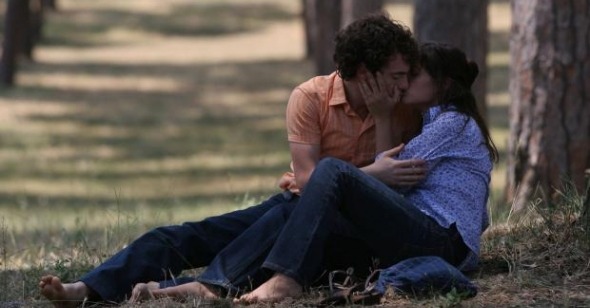Relational Aggression
by Brendon Bouzard
My Brother Is an Only Child
Dir. Daniele Luchetti, Italy, ThinkFilm
The latest in an increasingly exhausting sweep of Italian imports about that country’s political tensions in the late Sixties and Seventies, Daniele Luchetti’s My Brother Is an Only Child is, for a little more than half of its running time, a serviceable middlebrow jaunt through the life of Accio (Vittorio Emanuele Propizio as a boy, Elio Germano as an adult), a young misfit who turns to fascism to find camaraderie and escape from a distressed home life. The film hits all the stations of the cross of political awakening along the way; call it This Is Italy. There’s certainly more to it than that, though—Luchetti shoehorns a lot of plot into 105 minutes, and so we also follow the story of Accio’s brother, Manrico (Ricardo Scarmaccio), a dickish, womanizing sort increasingly drawn into revolutionary deeds as a communist activist, and that of the woman caught between them, Francesca (Diane Fleri), who’s just comely enough that Accio, distressed by the bureaucracy of his fellow fascists, decides communism might be the ideology for him after all (guh?).
At about this point, with a little less than an hour left to go, the film sputters out, devolving from an intriguing study of the politics of familial estrangement to a ho-hum romance of Pretty People Looking at Each Other Wistfully. Adapted by Sandro Petraglia and Stefano Rulli (The Best of Youth) from a popular novel by Antonio Pennacchi, the film makes an unfortunate turn away from political engagement before it can make any salutary or even particularly cogent assessments of the nature of that era’s troubles. As if to underline the flimsiness of the love narrative, the film turns episodic, breaking from googly-eyed shot/reverse shots with a silly subplot about a fascist cuckold vowing revenge against the newly converted Accio and an extended, belabored car-bombing digression. If the formal tropes are not those of classical melodrama—Luchetti’s film is all run-and-gun handheld camerawork and jump cuts—then the sentiment is, with its sun-splashed, pictorial lighting and quick, easy lapses into Franco Piersanti’s romantic score and some expertly chosen vintage pop.
Germano, ruddy-haired and with scrappy alley-cat bluster, is appealing as Accio; unlike his costars, he plays down bedroom-eyed mush in favor of a ravenous anxiety, uncomfortable grimaces, and half-informed political sputter. He’s got a natural talent for the comic reaction shot, as when he furrows his brow disgustedly watching an assembly of communist musicians perform a “de-fascistized” rendition of Beethoven’s Ninth. And he’s got a great sense for spontaneity in keeping with the film’s jaunty camerawork—when he awkwardly scales a fence to plant a bomb outside a door, he contorts his body with ideal clumsiness. The film’s most astute observations derive from his performance and that of Propizio as his impish younger self—the way a pissant middle child’s rebellion marks the origins of radical political involvement.
Though its scope was obviously larger, The Best of Youth proves an instructive comparative text—where that film is magnificent for refusing to allow its politically active characters to serve as emblems of some sort of Hegelian dialectic, My Brother is so disinterested in interrogating the political and social subtleties of its era that its characters feel like bullet points on a Wikipedia page. Coming on the heels of films of various tenors that do more than pay lip service to the political traumas of the era—The Best of Youth and Good Morning, Night among them—Luchetti’s retreat into the unremarkable love triangle at the heart of its second half feels both craven and glib. By the time the film injects a little Red Brigades intrigue into the mix, it’s too late. Luchetti’s stated intention to not produce a political film merely makes the bouncy, uncomplicated nostalgia of the piece a troubling gloss over a tense historical period that was itself partially defined by a pestilent nostalgia for Mussolini. Perhaps the filmmakers’ most telling decision was the title change—the boldly political Il Fasciocomunista becomes Mio fratello è figlio unico, which derives its name from a frothy Italian pop song. The resulting film suits its titular origins well—breezy, melodramatic, and ultimately pretty forgettable. The distributor’s press notes generously suggest that we compare Luchetti’s film to those of Bertolucci and Marco Bellocchio—I’ll do all three filmmakers a kindness by declining.
